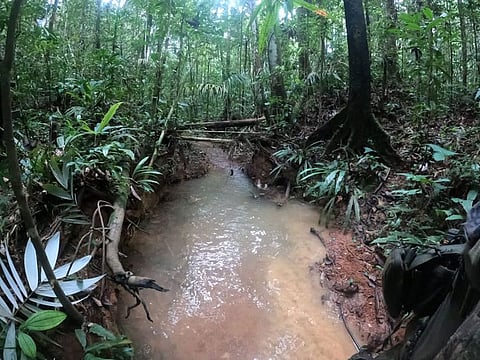Colombia president retracts claim children found after plane crash
More than 100 soldiers have been deployed with sniffer dogs to search for the minors

Bogota: Colombian President Gustavo Petro on Thursday retracted his claim that four Indigenous children missing for more than two weeks after an airplane crash in the Amazon had been found alive.
Writing on Twitter, Petro said he had deleted his tweet from Wednesday night in which he had announced the rescue of the four children, including an 11-month-old baby.
"I am sorry for what happened. The military forces and Indigenous communities will continue in their tireless search to give the country the news it is waiting for," he said.
More than 100 soldiers have been deployed with sniffer dogs to search for the minors who were traveling in an airplane that crashed on May 1, leaving three adults including the pilot and the children's mother dead.
Rescuers believe the children - who in addition to the 11-month-old include a 13, nine and four-year-old - have been wandering through the jungle in the southern Caqueta department since the crash.
"At this time there is no other priority other than progressing with the search until finding them," added Petro. "The children's lives are the most important thing."
Petro's stunning announcement on Wednesday had been met with uncertainty as he gave no details about where or how the children had been rescued, nor how they had survived alone in the jungle.
"Joy for the country," he had declared.
Amid widespread confusion, the military has not commented since Petro's announcement on Wednesday.
The children's grandmother, Fidencio Valencia said there was hope that they would be found alive since "they are used to being in the jungle."
She said they might be hiding out of fear but she told the Caracol Noticias television newscast that "Indigenous energy" would help the rescuers locate them.
Signs of survival
The government's Institute of Family Welfare said that it had on Wednesday received "information from the territory confirming contact with the four children."
It said the report indicated that "they had been found alive and are also in good health."
However, the agency acknowledged that the military had not been able to "establish official contact" due to bad weather and difficult terrain, and were continuing search and rescue operations.
Avianline Charters, owner of the crashed aircraft, had previously said that one of its pilots in the search area was told the children had been found and that they were being taken by boat downriver.
But the company also said that there was no confirmation that the children were out of danger, and thunderstorms posed a risk to them reaching safety.
On Wednesday, the armed forces had said their search efforts intensified after rescuers came across a "shelter built in an improvised way with sticks and branches," leading them to believe there were survivors.
In photographs released by the military, scissors, shoes, and hair ties could be seen among branches on the jungle floor.
A baby's drinking bottle and half-eaten pieces of fruit had been spotted before the shelter's discovery.
On Monday and Tuesday, soldiers found the bodies of the pilot and two adults who had been flying from a jungle location to San Jose del Guaviare, one of the main cities in Colombia's east where grasslands give way to Amazon rainforest.
Difficult access
Giant trees that can grow up to 40 meters tall and heavy rainfall made the "Operation Hope" search difficult.
Three helicopters were used to help, one of which blasted out a recorded message from the children's grandmother in their native Huitoto language telling them to stop moving through the jungle.
Authorities have not indicated what caused the plane crash.
The pilot had reported problems with the engine just minutes before the airplane disappeared from radars, Colombia's disaster response body said.
It is a region with few roads and is also difficult to access by river, so airplane transport is common.
The children are from the Indigenous Huitoto community, also spelled Witoto, who are known for living in harmony with the jungle.
The community develops skills in hunting, fishing and gathering, which may have helped the children to survive.
Exploitation, disease and assimilation have reduced the Huitoto population sharply over many decades.
Sign up for the Daily Briefing
Get the latest news and updates straight to your inbox



